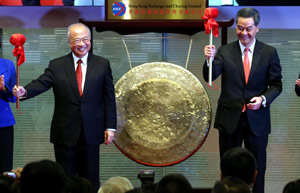China's interest-rate cut shows willingness to stimulate growth
Updated: 2014-11-24 11:52
By Amy He in New York and Jiang Xueqing in Beijing(China Daily USA)
|
||||||||
China's cutting interest rates to 5.6 percent shows that the government wants to put stimulus into place as the country's economy continues to slow, financial experts said.
"I think that there's a willingness to put the stimulus in place," said Ethan Harris, co-head of global economics and research at Bank of America Merrill Lynch.
"The momentum in China is in a different direction, and in fact, when you look at our forecast for next year, we think that there's a trend of growth decelerating from 7.2 percent this year to 6.8 percent next year," said Larry Adam, US chief investment officer and managing director of Deutsche Bank. "This is the primary reason why we saw that the central bank in China actually cut rates to try to stimulate some growth."
The People's Bank of China said on Nov 21 that it cut its one-year loan rate by 0.4 percent, the first reduction since July 2012. The central bank also cut its one-year deposit rate by 0.25 percent to 2.75 percent.
"I think the government is putting out an agenda of bolstering domestic reform as well as external reforms," said Wang Han, chief economist and managing director of Industrial Securities. "On the domestic issue, obviously the People's Bank of China (PBOC) cut interest rates, and that means that the PBOC has stepped forward to become the liquidity provider to keep reasonable growth."
Wang, Adam, and Harris made their remarks at the 2014 Asian Financial Society Summit in New York on Nov 21.
The central bank said in a statement that while China's economy is "running within the proper range and positive signs have emerged in economic restructuring," financing costs remain high and "obstructions still remain prominent problems for the real economy."
China's third quarter GDP was 7.3 percent, down from the 7.5 percent in the second quarter, and the country may miss its annual GDP target for the first time since the Asian financial crisis in 1998.
"After several attempts to tackle high financing costs since in July, things have eased in some regions, but companies still face operational difficulties, and some, especially smaller firms, are more vulnerable to high costs than others," the bank said.
The bank's decision to cut rates came two days after the State Council promised to ease the financial burdens for companies, according to Xinhua.
More flexibility will be given to the calculation of loan-to-deposit ratio for financial institutions to "better their capability to support small and micro businesses" and farmers, the State Council said in a statement.
"It's absolutely the right thing to do," said Wang Tao, chief China economist at UBS AG in Hong Kong. "Real interest rates have moved up significantly with slowing growth and inflation, which hurts corporate cash flow and balance sheets and threatens to increase nonperforming loans."
Xiang Songzuo, chief economist at Agricultural Bank of China, said: "The Chinese economy is still maintaining relatively fast growth. There is no need for the government to roll out strong stimulus measures.
"The central bank is sticking to and improving the mechanism for interest rate adjustment by using interest rate tools flexibly to fine-tune the economy."
Xiang said the reduction will take interest rates to a reasonable level and also provide a neutral and moderate monetary policy environment for sustainable development of the economy.
Lu Zhengwei, chief economist at Industrial Bank, said, "The cut will help to lower financing costs systematically at the start of next year, especially those for small businesses, the farming sector and real estate sector."
Ann Lee, professor of business and economics at New York University, said the move is helpful.
"First, it may pave the way to more interest rate liberalization.The rate cut may ease the number of non-performing loans that are growing at the banks. It can also help entice corporates to borrow more and certainly ease the burden on existing mortgage borrowers so that they will have more disposable income to spend," Lee said.
"And this may be the first of more moves down the road to help Chinese corporates compete with Japanese companies that have enjoyed the competitive benefits that come from a steeply falling currency."
Contact the writers at amyhe@chinadailyusa.com and jiangxueqing@chinadaily.com.cn

 Ferguson grand jury has reached decision
Ferguson grand jury has reached decision
 Top 7 affects of rate cut on people's life
Top 7 affects of rate cut on people's life
 42nd International Emmy Awards held in New York
42nd International Emmy Awards held in New York
 People visit Christmas market in Berlin
People visit Christmas market in Berlin
 Forbidden City more welcoming
Forbidden City more welcoming
 Olympic champ Sun Yang failed doping test in May
Olympic champ Sun Yang failed doping test in May
 Top 10 kinds of foreigners in China
Top 10 kinds of foreigners in China
 Trending: Hangzhou man licks out painting
Trending: Hangzhou man licks out painting
Most Viewed
Editor's Picks

|

|

|

|

|

|
Today's Top News
Hagel move won't affect China-US ties: experts
China's nuclear power bid saluted
No indictment of officer in fatal Missouri shooting
Chinese real estate stocks continue rise on rate cut
Women entrepreneurs get financial tips
Wealthy want kids to study abroad
Breast cancer study receives $1.5 million grant
SAT scores canceled for some test-takers in China, Korea
US Weekly

|

|







